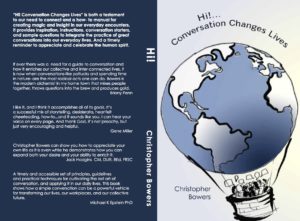‘Hi .. Conversation Changes Lives’ Book Blog

“Hi” is a wealth of information that will encourage you, entice you, to take the first tentative steps to engage with others, to develop a sense of worth in one’s involvement with others, and with the community we share.
I highly recommend this treasure trove of practices, delightful story ‘snippets’, and compelling rationale for conversation. — Ken Annandale, Educator
We welcome your comments, and experiences as you let conversation change your life after reading the book. View a TV feature about Hi or view our entertaining book launch

About ten days ago I went Knox United Church in Vancouver. Shortly after I sat down I began to feel an aura of meditation surrounding me. The church service was helpful, much more than the United Church in New Westminster. A woman sat down at the far end of the pew I was in. She moved a lot and seemed to be trying to get my attention. Another woman sat with her, got up and then her or another woman sat with her again.
When the Reverend began his sermon he talked about his daughter starting her first job and finding a place to live, the first time away from home. There were rules which he listed, one of which was no male visitors overnight. When he mentioned this the woman on the pew dropped something making a loud noise. She then got down on her hands and knees on the floor. When I turned to look she looked up at me and seemed to be indicating that she is a submissive looking for someone to dominate her, a master.
At the end of the service I was the first to leave and the Reverend said it was good to see me.
Being a foreigner makes, in many ways, conversation easy. I’m constantly asking strangers on the street questions, which often leads to them asking me a question back, and voila, you’re in a conversation. However, at some early point in the book I realized that conversations, like most things, are not necessarily better because they’re easy. It made me think, a lot, about what I could ask people beyond the level of, “how do I get to a grocery store” which is more complicated than one may originally realize. Different cultures have different taboos, and it’s often impossible to know what those taboos are without breaching them. Likewise, one must expect questions that a stranger, in our culture, would not normally ask. And it’s not just the questions. Answers, from seemingly trivial questions, can solicit unexpected, at times emotional, responses. Knowing this sharpens the focus on interactions you are trying to make more meaningful, self-fufillingly doing so. So far I’ve had a lot of success with things like, ”If you could change one thing about your culture; what would it be?” or, “What do you think it would take to make the people in your country happier and more fulfilled?” Things on that level always yield a response, and don’t ruffle any feathers. This entire train of thought came from reading the book and I’m very thankful for that.
Thanks for sending me the link to your book. To be honest I don’t exactly remember the questions you asked me about it, but I have a few comments.
It’s co-incidental that, not only did I read the book where it began—Yucatan—but I’ve just arrived back there, and plan on reading it over again while we’re here. Also co-incidental, and interesting to me as a full time traveler, is the travel theme. It coagulated a lot of thoughts I’ve had regarding conversations with strangers.
Today at work, a coworker surprised me with a doughnut because I had helped him the day before. Something as simple as this shows that he was grateful for the time I had given him, and greatly improved my attitude before work even started. I will most certainly be paying it forward.
Work has gone well. Meeting my friend for a drink and his influence in getting me involved in community oriented groups. Green Drinks, New West Environment Partners and Walkers Caucus.
You motivated me to become more involved in my community. Thanks for that.
I am more friendly with women now and becoming aware of their interest in romance. It is time for me to try to initiate a relationship with one or more.
I am gradually becoming more involved in the community.
Thank you for your interest and the ideas from your book.